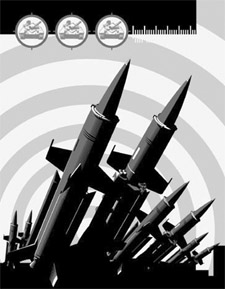Feb 22, 2026
Feb 22, 2026
 The firing of half a dozen long range ballistic missiles in the last couple of days, without any provocation by North Korea, highlights the problem that the international community is facing in the management of rogue states. Rogue states simply put are states which display irresponsible political and strategic behavior and engaged in destabilizing their regional neighborhoods. Such states are normally failed states or failing states under military rule or dictatorial rule which brutally suppress their peoples and deny democracy and liberal institutions. In view of their defiance of the norms of international behavior no nation wants to invest in such countries and hence their economies are in a mess. They survive on economic aid provided by one or the other major powers who have a vested interest in their utility as regional destabilizes. Yet such states spend millions of dollars on nuclear weapons and long range ballistic missiles programs so as to enhance their powers of blackmail of the international community and their neighbors. Where does the money come from for such rogue nations and their access to advanced technologies? It again comes from their strategic patrons and also from black marketing of nuclear and missile technologies besides drug trafficking.
The firing of half a dozen long range ballistic missiles in the last couple of days, without any provocation by North Korea, highlights the problem that the international community is facing in the management of rogue states. Rogue states simply put are states which display irresponsible political and strategic behavior and engaged in destabilizing their regional neighborhoods. Such states are normally failed states or failing states under military rule or dictatorial rule which brutally suppress their peoples and deny democracy and liberal institutions. In view of their defiance of the norms of international behavior no nation wants to invest in such countries and hence their economies are in a mess. They survive on economic aid provided by one or the other major powers who have a vested interest in their utility as regional destabilizes. Yet such states spend millions of dollars on nuclear weapons and long range ballistic missiles programs so as to enhance their powers of blackmail of the international community and their neighbors. Where does the money come from for such rogue nations and their access to advanced technologies? It again comes from their strategic patrons and also from black marketing of nuclear and missile technologies besides drug trafficking.
Pakistan and North Korea stand out as the more significant states that fall into this category. Pakistan was a failed state in the assessment of most major United States think tanks till the precise moment when the 9/11 bombings took place. It was revived by massive dose of American economic aid in lieu of buckling under American pressure to open its military bases for United States military intervention in Afghanistan. With a failed economy Pakistan all along was busy building nuclear weapons and acquiring long range ballistic missiles for its arsenals. Pakistan is said to have about 70-80 nuclear weapons and dozens of long range missiles. Pakistan has all along been a garrison state under the iron grip of the Pakistan Army Generals.
North Korea was all along a failed state standing out as a pitiable comparison to their compatriots in South Korea which had zoomed to economic advancement. Its agrarian economy could hardy provide sustenance and there was no industry worth the name. It was a highly regimented nation where dissent was brutally suppressed. Yet North Korea has been able to build ballistic missiles of intercontinental range and reportedly has a couple of nuclear weapons.
Pakistan and North Korea can therefore be seen as having many things in common both as failed states and rogue nuclear weapons states. Both of them have geographical contiguity with China ,and have strong military ties with China. Both are China's strategic prot'g's and act as regional strategic destabilizes at its behest. China actively promoted and facilitated the Pakistani acquisition of nuclear weapons and by proxy in the case of North Korea.
It is a well known fact that North Korea has supplied Pakistan with the long range Nodong missiles to which Pakistan gave the names of Afghan invaders of India. In exchange Pakistan provided North Korea with technical assistance for production of nuclear weapons. Pakistan is also credited with providing nuclear weapons blueprints and materials to Libya , Iran and new reports suggesting to Saudi Arabia also. It is also being said that North Korean involvement exists also in the Iranian missile programme.
In all this maze of Pakistan's and North Korean clandestine nuclear weapons and missile developments China hovers ominously and irrefutably. China seems to have not bothered to hesitate in putting the weapons of mass destruction in the hands of failed states which have traded in them roguishly thereafter.
The big question is what was the United States doing all along in impeding or preventing the spread of weapons of mass destruction. The sad fact is that while American intelligence agencies were providing vital intelligence inputs on this account to successive US Administrations, they looked away as at that particular moment strategic expediency forced them to condone Pakistani and North Korean misdeeds.
Tragically today, the US Administration has been forced into a position where Pakistan refuses to give access to the United States to Dr A Q Khan for questioning as he possesses inside information of the complicity of Pakistani Generals in the nuclear weapons trade and North Korea defiantly fires salvoes of missiles to muddy the strategic situation in East Asia.
The big lesson for the United States that emerges from these developments is that the United States should never have been permissive on the misdeeds of failed states like Pakistan and North Korea and nipped their mischief in the bud.
09-Jul-2006
More by : Dr. Subhash Kapila